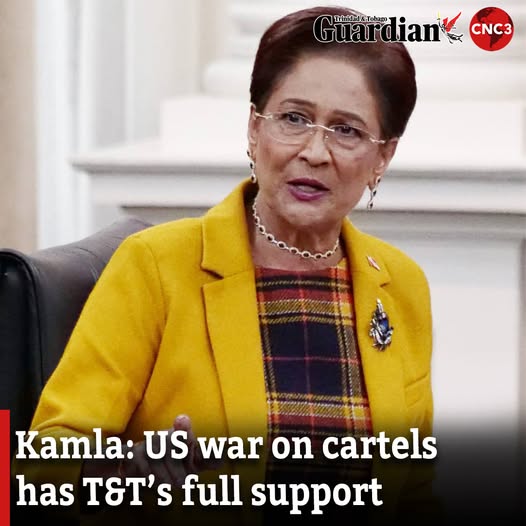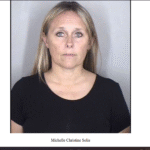PORT OF SPAIN – Days after the Trump administration began deploying Navy destroyers and amphibious warships to bolster security near the coast of Venezuela, Caribbean governments are slowly starting to break their silence on the unusual mission.
On Saturday, as the ships moved towards the Venezuelan coast, the government of Trinidad and Tobago said the deployment of the “American military assets” to destroy terrorist drug cartels not only has its full support, but should the regime of Venezuelan leader Nicolás Maduro launch any attack against neighboring Guyana and the Trump administration were to call upon Trinidad and Tobago to help, it would do so.
“Trinidad and Tobago has always had good relations with the Venezuelan people and that will continue,” Prime Minister Kamala Persad-Bissessar said in a statement. “However, I want to make it very clear that if the Maduro regime launches any attack against the Guyanese people or invades Guyanese territory and a request is made by the American government for access to Trinidadian territory to defend the people of Guyana, my government will unflinchingly provide them that access.”
Guyana and Venezuela have been engaged in a tense border dispute over the Essequibo region, which has led Washington to keep a close eye over the area. After the Trump administration began increasing U.S. military presence in the southern Caribbean, Maduro announced plans to mobilize over 4.5 million militia members across the country to “defend national sovereignty.”
Both the threats and the U.S. deployment had been met with silence by Caribbean leaders. On Friday, oil-rich Guyana was the first to seemingly throw its support behind the measure with a statement that the government is “committed to working with our bilateral partners to find meaningful solutions and will support regional and global initiatives aimed at dismantling criminal networks to safeguard our shared security.”
On Saturday, Persad-Bissessar was much more direct and went as far as defending the Trump administration amid questions about the true intent of deploying U.S. Navy destroyers — the USS Gravely, USS Jason Dunham and USS Sampson — and a powerful amphibious squadron to the region. She cited her nation’s 20-year battle with rising murder rates and other violent crimes as her reasons.
“Due to drug, human and firearms trafficking, Caribbean countries, and in particular Trinidad and Tobago, have experienced massive spikes in transnational crime, gang activity, murders, violence and financial crimes,” she said.
Last year was Trinidad and Tobago’s deadliest on record as the oil-rich nation recorded 625 murders and a homicide rate of 45.7, according to Insight Crime. The country’s violence was closely related to gang activity, with 43.6% of murders related to gangs, the analysis said. Meanwhile, Suriname, Barbados and Turks and Caicos also saw huge spikes in homicide rates. “These three countries saw their murder rates grow by more than 100%, putting the Caribbean in the top homicide hotspot for yet another,” Insight Crime said.

Earlier this year, Jamaica Prime Minister Andrew Holness said that gangs should be declared terrorists because of the record-breaking violence with which Caribbean countries are being hit.
“Small island states like ours simply do not have the financial and military resources to take on the drug cartels,” Persad-Bissessar said. “Cartels have been enabled to embed themselves into the high echelons of Caribbean societies, thereby exhibiting significant influence in political, legislative, media, banking, security and economic decisions, often rendering governments toothless to enact actual change to stop criminal activity,” she added.
The government of Guyana, which has called for general elections on Sept. 1, said on Friday that it views with “grave concern the threat to peace and security in the region” posed by transnational organized crime and narco-terrorism.
“By confronting transnational organized crime and narco-terrorism with unity, we reaffirm our dedication to upholding the rule of law and ensuring that the region remains a Zone of Peace,” the statement added.
The U.S. deployment has raised concerns over possible escalation in the region, where there remains support among some Caribbean governments for Venezuela and Maduro. Also, some countries have cooperation agreements with the South American nation for drug interdictions.
At the same time, some are questioning the motives of Washington, which had been pulling back cooperation on Drug Enforcement Administration interdictions in countries including the Bahamas and Haiti, and despite concerns about record violent crime in the region, has raised the possibility of small island nations accepting third-country migrants deported from the U.S.
“It is shocking to hear some persons using referrals to the Caribbean region as a zone of peace to push negative commentary on the U.S. military deployment against these terrorist cartels,” Persad-Bissessar said. “The only persons who should be worried about the activity of the U.S. military are those engaged in or enabling criminal activity. Law-abiding citizens have nothing to fear.”
The U.S. military is operating legally in international waters within the region and has not breached any nation’s sovereignty, she said. The prime minister, who returned to power in April after a 10-year political drought by her party, said the Trump administration has made no requests “for their military assets to access Trinidadian territory for any military action against the Venezuelan regime.”
The U.S.’ show of force in the Caribbean began this week as the Pentagon ordered a powerful amphibious squadron and Navy destroyers into the southern Caribbean, ostensibly to conduct U.S. counternarcotics operations. The squadron and the three Arleigh Burke-class guided missile destroyers — the USS Sampson, USS Jason Dunham and USS Gravely — are designed to counter threats from the air, land, sea and even undersea simultaneously.
Until now, Caribbean governments had not said anything and the Caribbean community regional bloc known as CARICOM, made up of 14 independent countries, has yet to say anything as a group. The bloc’s current chair is Holness, who is also campaigning for another term with general elections in Jamaica scheduled for September 3.
“The Trinidad and Tobago government has not engaged and has no intention of engaging CARICOM on this matter; each member state can speak for themselves on this issue,” Persad-Bissessar said. “Trinidad and Tobago has been helplessly drowning in blood and violence for the last twenty years; Vice President [J.D.] Vance spoke the truth when he mentioned our high murder and crime rates. Therefore, no amount of Trump derangement syndrome tantrums and anti-American propaganda will prevent my government from welcoming assistance to combat the terrorist drug cartels. Other CARICOM countries are free to make their decisions based on the best interests of their citizens.”
By JACQUELINE CHARLES/Miami Herald



